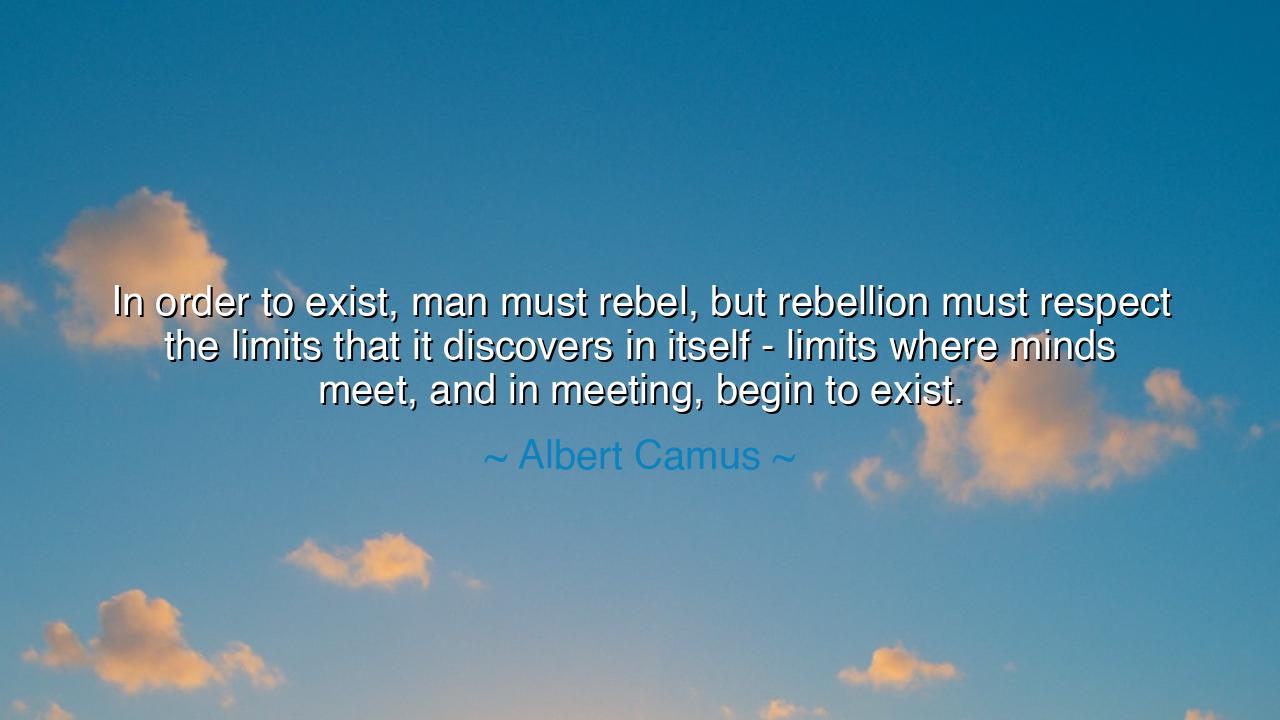
In order to exist, man must rebel, but rebellion must respect the
In order to exist, man must rebel, but rebellion must respect the limits that it discovers in itself - limits where minds meet, and in meeting, begin to exist.






In order to exist, man must rebel, but rebellion must respect the limits that it discovers in itself—limits where minds meet, and in meeting, begin to exist. These words of Albert Camus echo the ancient wisdom that life, in its very essence, demands the spirit of defiance. But true defiance, true rebellion, is not born of mere destruction or disregard for the world’s established order. Instead, it emerges from the understanding of boundaries—those invisible, yet profoundly real, lines that define the human condition.
Rebellion, in its rawest form, represents the eternal struggle against oppression, against the forces that seek to crush the human spirit. It is the spark that ignites when one refuses to submit to the injustices of life. Just as the gods of old rebelled against fate or the cruel whims of destiny, so too does man, driven by an inner fire, stand against the unyielding forces that seek to bind him. The rebel does not seek to destroy for destruction's sake; rather, he seeks the truth that lies in the breaking of chains, in the freedom of the mind.
Yet, in Camus’s wisdom, rebellion is not boundless. Rebellion must respect the limits that it discovers in itself. For it is through understanding the self that true defiance can flourish. The limits of rebellion are not merely external forces but are found deep within the human soul. It is when rebellion knows its own vulnerabilities, its own imperfections, that it becomes truly powerful. There is a profound strength in recognizing the boundaries that make us human. Without these boundaries, rebellion risks becoming chaos, spiraling into destruction that serves no purpose other than to wound the soul.
In ancient times, the Greek myth of Prometheus offers a powerful example of rebellion’s duality. Prometheus, the Titan, defied the gods to bring fire to humanity, an act of rebellion that gave birth to civilization itself. Yet, in his rebellion, Prometheus did not destroy the gods but instead sought to empower mankind. His rebellion was not born of blind rage but of love and the desire to uplift humanity. His defiance came with a price—he was bound to a rock, his liver eaten by an eagle each day—but it was through this suffering that he became a symbol of the human struggle for knowledge and freedom. Prometheus understood the limits of his rebellion, and within those limits, he brought the light of civilization.
Similarly, in our own age, we see rebellion in the struggle for civil rights. The American Civil Rights Movement led by figures like Martin Luther King Jr. was a rebellion against the social order of the time. However, this rebellion was not a mindless outburst of violence but a measured, peaceful resistance that respected the inherent dignity of all people. King understood that rebellion must have limits—a respect for the human spirit and the belief that minds must meet, not in violence, but in understanding. His was a rebellion that sought not the destruction of society but its renewal.
The lesson from Camus’s words is clear: true rebellion is born not from mindless rage but from a deep reflection on the nature of existence. To rebel is to recognize that existence itself is fraught with limitations, but it is through acknowledging these limits that we come to understand the fullness of life. The act of rebellion, when done with wisdom and respect, leads not to the destruction of the self but to the emergence of a new existence, one where human minds meet, and in their meeting, begin to create something greater than the sum of their parts.
Therefore, let us, the descendants of those who rebelled before us, learn the true nature of rebellion. Let our struggles be ones that respect the boundaries of our humanity, that do not seek to destroy but to uplift, to create, and to bring forth a world where minds can meet in harmony. Let us remember that true rebellion is not chaos but the recognition of the order that resides in the chaos. In this, we begin to exist in a way that transcends mere survival and touches the eternal.






AAdministratorAdministrator
Welcome, honored guests. Please leave a comment, we will respond soon